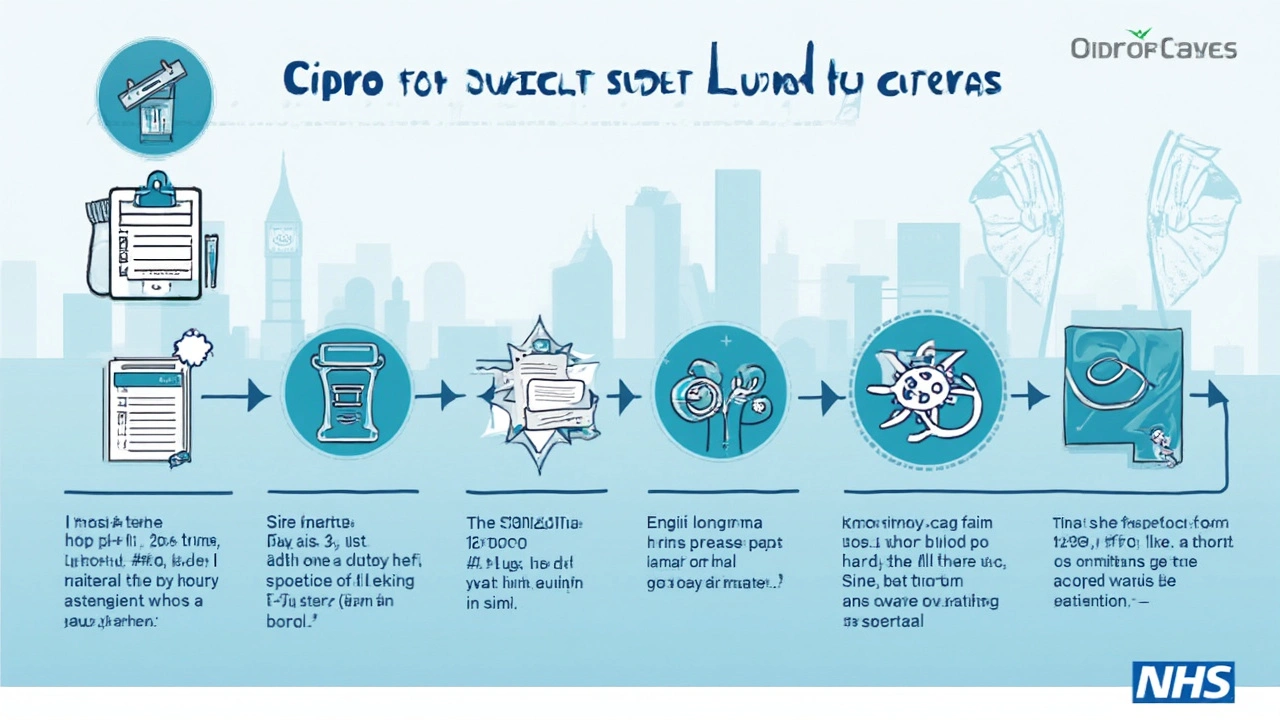You probably don’t spend much time thinking about antibiotics—until an infection knocks you down, and suddenly names like "Cipro" start popping up. This pill is infamous both for what it can cure and what it can sometimes cause. Stories abound: someone’s UTI vanishes after a few doses, then you hear rumors about serious side effects that sound more like warnings from a horror movie than something you’ll find in your medicine cabinet. If your doctor hands you a prescription for Cipro, what should you really expect?
What Is Cipro and When Is It Prescribed?
Let’s get to the basics first. Cipro, short for ciprofloxacin, is a part of the fluoroquinolone family—a group of broad-spectrum antibiotics. In simple terms, it works by sabotaging the DNA replication machinery of certain bacteria, making it impossible for them to multiply. Doctors reach for this drug when facing tough infections that don’t blink at milder options. It’s often a go-to for urinary tract infections (UTIs), kidney infections (pyelonephritis), some respiratory tract infections, and even more stubborn cases like bone or joint infections.
So why not slap it on every sore throat? Bacterial resistance. Overusing strong antibiotics like Cipro can encourage the rise of superbugs—bacteria so sly, other antibiotics can’t touch them. Doctors have to think strategically, saving Cipro for times when it really counts. If you grab your pill bottle, you’ll probably see a dosage somewhere between 250 mg and 750 mg per tablet, taken once or twice a day. People with weaker kidneys might need a lower dose, so don’t just copy what a friend is taking—it really does matter.
You might be surprised at the range of bugs this antibiotic can hit. Here’s a list of infections doctors typically treat with Cipro:
- Complicated and uncomplicated urinary tract infections
- Certain types of pneumonia (especially when caused by Pseudomonas aeruginosa)
- Travelers’ diarrhea caused by E. coli
- Typhoid fever
- Skin and soft tissue infections
- Bone and joint infections
- Some sexually transmitted infections (like gonorrhea if other antibiotics won’t do the trick)
- Prostate infections (prostatitis)
One odd fact? Cipro made headlines in 2001 as the treatment of choice for people potentially exposed to anthrax. The government stockpiled mountains of it, turning a regular drug into a symbol of public health defense. That moment highlighted how powerful—and how critical—Cipro is when doctors run out of options.
While Cipro seems like a medicine-room superhero, it doesn’t touch viral infections. If you’ve got the common cold or flu, taking Cipro won’t help and just increases the risk of resistance. Only take it when prescribed for a real bacterial enemy. And remember: don’t stop taking it early, even if you feel better. Quitting mid-way just gives bacteria a chance to regroup and come back angrier than before.

Cipro Side Effects and Interactions: What You Really Need to Know
This is where things get interesting—and maybe a little scary. You’ve probably heard stories ranging from mild tummy upset to serious, even rare, side effects. So, what’s the real story?
Let’s start with the usual stuff. The most common side effects are typically mild and fade after a few days or go away once the medication is done. For Cipro, that means you might have:
- Nausea or vomiting
- Diarrhea
- Stomach pain
- Headache
- Restlessness or trouble sleeping
Some people get a metallic taste in their mouth. Others notice their skin becomes a little more sensitive to sunlight. If you’re headed outdoors, slap on some sunscreen or cover up more than usual. Sunburn sneaks up fast when you’re on Cipro.
Here’s the stuff you don’t hear about at every pharmacy counter. Cipro carries what's called a "black box warning" from the FDA. That’s the strongest alert possible. Why? Rare but serious side effects can pop up, even with short-term use. The most dramatic of these:
- Tendon rupture or swelling (tendinitis), especially the Achilles tendon
- Permanent nerve damage (peripheral neuropathy)
- Mental health changes (hallucinations, anxiety, depression, confusion)
- Blood sugar fluctuations, sometimes dangerously high or low
If you’re over 60, taking steroids, or you have a kidney/heart/lung transplant, the risk for tendon problems goes up. If you’re an athlete or run for fun, that tendon rupture risk should make you pause. Cases have been reported in teens and even kids, although it’s rare. In almost every case, pausing exercise while on this antibiotic is a smart move.
Ever feel tingling, numbness, or unexpected pain in your hands and feet? That might be peripheral neuropathy—a pretty alarming side effect. Stop Cipro and call your doctor right away if it happens. The quicker you react, the more likely those symptoms will go away. Waiting can mean the changes stick around permanently.
Let’s talk numbers for a second. In a study published in the New England Journal of Medicine (2019), the risk of Achilles tendon rupture with fluoroquinolones was 3.7 per 100,000 prescriptions for healthy adults, but if you're older and on steroids, that number climbs substantially. Another catch: the risk of some side effects (especially nerve damage) can pop up after just a few doses and don't always go away once you stop the medicine.
What about mixing Cipro with other drugs or even food? It interacts with a surprising number of things:
- Calcium, magnesium, antacids, and iron supplements can block Cipro’s absorption. Take Cipro two hours before or six hours after these.
- Caffeine can stick around in your system longer, making you jittery.
- Blood thinners like warfarin mix badly, boosting your risk of bleeding.
- Some heart rhythm medications (like amiodarone) can lead to dangerous heartbeats.
Alcohol isn’t strictly forbidden, but pair it with Cipro and you’re more likely to get side effects like dizziness or nausea. So play it safe and stick to water for a few days. Grapefruit juice and dairy products are also bad company for Cipro—they mess with how well your body absorbs the drug.
Curious about how Cipro stacks up against other antibiotics in side effects or effectiveness? Here’s some real data:
| Antibiotic | Common Uses | Common Side Effects | Serious Risks |
|---|---|---|---|
| Cipro (ciprofloxacin) | UTI, bone/joint, respiratory infections | GI upset, headache, insomnia | Tendon rupture, nerve damage, mental health effects |
| Amoxicillin | Ear, sinus, respiratory, UTI | Rash, GI upset | Rare severe allergic reaction |
| Trimethoprim-sulfamethoxazole | UTI, skin, respiratory | Rash, GI upset, sun sensitivity | Severe rash (Stevens-Johnson), blood disorders |
| Azithromycin | Respiratory, STD, skin | GI upset | Heart rhythm problems (rare) |
Does all this mean you should fear Cipro? Not exactly. Many people take it with no issues at all. But it does mean you should go into it with eyes open and never ignore new or weird symptoms.

Tips for Taking Cipro Safely and Getting the Most Out of It
You’ve got your prescription. How can you make sure you get the benefits without the drama? Start with timing: Always take Cipro exactly as prescribed—same times each day, finish the full course, even if you’re feeling right as rain after a couple days. Skipping doses or ditching your pills too soon can bring on resistant bacteria, making future infections way harder to treat.
Don’t be tempted to double up if you miss a dose. Just take your next dose on schedule. Cipro hangs out in your system long enough to keep fighting off bugs, so overdosing just means more side effects, not better results.
Swallow the tablets with water and avoid taking them with milk, yogurt, or calcium-rich drinks. Cipro binds to minerals in these foods, making it nearly useless. Same goes for antacids and iron pills—keep at least a two-hour gap before or after. Got an iron-rich meal or multivitamin in your regimen? Time it outside your Cipro window.
- Finish every pill—even if you’re feeling better
- Store the medicine away from light and moisture
- Drink extra fluids to help your kidneys flush things out
- Protect your skin in the sun (think wide-brim hat and high-SPF sunscreen)
- If you notice tendon pain or swelling, stop right away and call your doctor
- Report tingling, numbness, or burning sensations fast
- Avoid strenuous exercise—tendons are more fragile right now
If you have a history of seizures, low potassium, or any heart issues, always remind your doctor before starting Cipro. Sometimes all you need is a different antibiotic to steer clear of problems. And if you’re pregnant, breastfeeding, or thinking about it, Cipro isn’t usually the first choice—there are safer options.
Wondering about age limits? Kids generally only get Cipro for very specific, serious infections—never for the regular stuff. Studies in children showed a slightly higher risk of joint and tendon problems, so doctors keep it off the playground unless absolutely necessary.
Let’s tackle something that gets glossed over: Cipro and mental health. Some people experience vivid nightmares, confusion, anxiety, or even hallucinations. Goofy dreams might be no big deal, but sudden mood shifts or paranoia scream for a phone call to your doctor. Most of the time, symptoms fade once you stop the drug, but don’t tough it out hoping they’ll vanish on their own.
For women, one tip—Cipro can throw off the balance of natural bacteria, meaning yeast infections sometimes follow. If you spot symptoms like itching or discharge, reach for an over-the-counter remedy or talk to your doctor for prescription options.
If you’re traveling, especially to areas with less reliable water systems, Cipro has a reputation for saving vacations gone wrong thanks to its use in treating traveler’s diarrhea. Just don't rely on it unless a doctor suggests it—random use just encourages resistance. Pack your prescription, but stick to safe eating and drinking habits first.
And about allergies: if you’ve ever had a serious reaction to another fluoroquinolone (like levofloxacin), stay away from Cipro. Symptoms like swelling, breathing trouble, or a severe rash mean an ER visit, fast. True allergies are rare, but they do happen.
Torn between using Cipro and worried about the risks? Most doctors weigh your overall health, risk factors, and infection type carefully. It’s not about playing roulette; it’s about targeted, thoughtful use. You’re part of that discussion. Ask questions, give honest health history, and don’t ignore what your body’s telling you while taking this med. Antibiotics are life savers, but only if handled wisely.


Frank Pennetti
July 18, 2025 AT 09:56So, Cipro, eh? Another one of those fluoroquinolones they toss at infections like it’s candy. I mean, sure it’s effective but let’s not kid ourselves, the risk profile is just outrageous.
Tendonitis, nerve damage, serious hypersensitivity reactions — it’s like playing Russian roulette with your body’s infrastructure. Doctors often prescribe it far too casually without adequately weighing alternatives or informing about severe long-term consequences.
From a pharmacological perspective, the mechanism involving DNA gyrase inhibition is undeniably brilliant, but it certainly comes with a hefty trade-off. Ever notice how these side effects can mimic other conditions, making diagnosis tricky and confounding?
And then there’s the question of resistance; bacteria rapidly adapt under selective pressure, rendering Cipro’s once sharp edge blunted over time.
Honestly, if you’re looking for a one-size-fits-all antibiotic, this isn’t your holy grail. Use it judiciously and keep a keen eye on warning signs or you’ll pay the price.
Adam Baxter
July 19, 2025 AT 15:00Wow, that’s some deep critique! But hey, it’s still saved loads of lives! No drug is perfect. We gotta focus on the benefits. The article breaks things down neatly, makes it easy for folks to understand what’s up with Cipro. This kind of clarity helps people take meds correctly and not freak out when they see weird side effects mentioned elsewhere.
If you get the basics, like finishing the full course and watching for bad reactions, chances are you’ll be fine. So let’s not scare people away from something that actually works!
What’s the alternative, ignoring infections? That’s way worse. Cheers to useful antibiotics doing their thing!
Keri Henderson
July 20, 2025 AT 17:15I totally get the concerns about side effects, but the key here is responsible use and patient education. This article seems like a solid resource to inform patients about what they need to watch out for, and that’s huge in preventing complications.
People often don’t realize how important it is to avoid certain drug interactions or to adhere to dosage recommendations strictly. Cipro can be a lifesaver if taken right, and no one should be left in the dark about its risks.
Medical professionals should make sure that the discussion about these antibiotics is transparent.
I’d also recommend patients report any unusual symptoms immediately. Early detection of side effects can make a world of difference!
elvin casimir
July 21, 2025 AT 22:33frank's got some valid points but man, some of the jargon is a bit much for casual readers reading this post. let’s be honest, not everyone’s gonna dive deep into dna gyrase and resistance mechanics. sometimes simple is better.
also, i’d say most doctors these days are pretty cautious about prescribing cipro because of the bad rep it’s earned. yeah, side effects can be gnarly, but when you’re talking about potentially saving a life? gotta play the cards you get.
did anyone notice that the post didn’t mention the fewer risks for people not prone to tendon issues or the contraindications for children? lowkey important info for sure.
still curious, anyone here experienced these side effects firsthand? share your stories!
Steve Batancs
July 23, 2025 AT 03:43This antibiotic is a vital part of American healthcare—providing a robust treatment option against serious bacterial infections. Nothing should be taken lightly when it comes to national health, and safeguarding our citizens with effective medicine like Cipro is crucial.
However, we must insist on strict protocols to minimize adverse events and ensure the public is fully educated about how to use this drug properly.
While I support its availability, I strongly condemn any lax attitudes towards prescription guidelines. National health security depends on sound medical practices, not recklessness.
Ragha Vema
July 24, 2025 AT 08:53Guys, what if I told you that pharma companies hype drugs like Cipro to keep us dependent, while downplaying the risks?
I've read stories of people suffering permanent nerve damage, and this stuff is pushed way too much.
This article kind of glosses over the darker side, makes it sound all neat and manageable, but come on, that's a cover-up tactic.
I bet there’s a shadowy agenda to keep antibiotics rolling out to boost profits while sidelining holistic or less harmful treatments.
Stay vigilant, don’t just take meds because a label says “safe,” dig deeper folks!
Scott Mcquain
July 25, 2025 AT 14:03One’s moral obligation must be to prioritize well-being and objective truth over biases. Cipro is no panacea; it carries significant risks but also undeniable medical utility.
It’s essential to fully disclose dangers, monitor patient responses meticulously, and restrict use to clear indications only. Ethics demand transparency in informing about side effects, ranging from tendon rupture probability to CNS disturbances.
Patient autonomy hinges on comprehensive data, not vague assurances. Thus, this article serves an important role in promoting informed decisions.
However, continual vigilance is mandatory to prevent careless overprescription.
kuldeep singh sandhu
July 26, 2025 AT 19:13Not everyone agrees on Cipro’s widespread use. In India, we see different approaches due to antibiotic resistance strains and local practices.
I think sometimes Western-centric analysis misses nuances relevant elsewhere.
Also, broad-spectrum antibiotics like this might disrupt gut microbiota significantly, which is a big concern that wasn’t deeply covered here.
Anyone else observing this in their clinical experience or personal treatment?
Mariah Dietzler
July 28, 2025 AT 00:15The article is okay but feels a bit surface level. I was hoping for more recent research references or patient testimonials. It’s always helpful to see real stories or data on incidence rates of the major side effects.
Also, a quick drug interaction chart would’ve been nice for quick reference. That’s usually what I look for in these medication articles.
Overall, the language is accessible though, so that’s a plus. What do others think about the balance between readability and depth here?
Nicola Strand
July 29, 2025 AT 05:16While the article does its job, it skirts around the ethical issues with antibiotic overprescription, particularly in the West.
We must resist the herd mentality that whatever the doctor prescribes is always right. Inappropriate use of drugs like Cipro not only harms individuals but exacerbates global resistance crises.
I expect more responsibility both from healthcare providers and patients.
The text should have included stronger calls for antibiotic stewardship.
Jackie Zheng
July 30, 2025 AT 10:26I appreciate how this post tries to simplify complex medical information but I gotta nitpick on a few grammar points and phrasing choices that felt off.
For instance, the word 'potent' gets overused and borders on misleading without context. Potent can mean different things depending on pharmacodynamics which readers might not grasp.
Also, the phrase “special but doctors use it with caution” is a bit vague—why special? Why caution?
The article could benefit from refining language to balance friendliness with precision, especially since it aims to educate a wide audience. This would boost credibility and user trust.
Anyone else get a bit distracted by wording here?